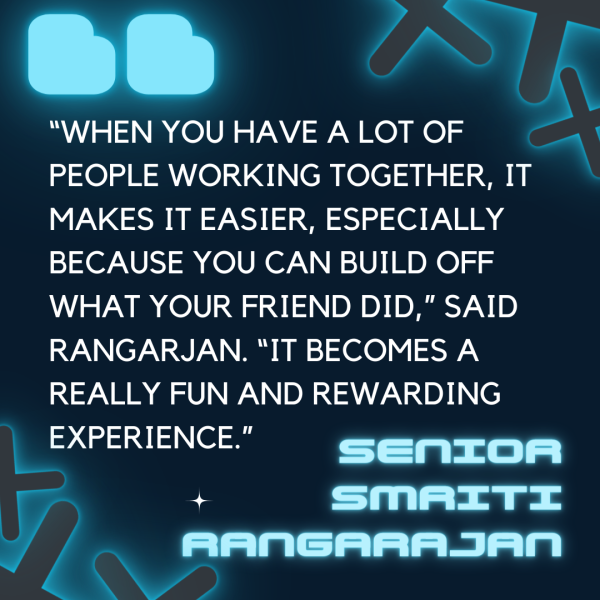When senior Smriti Rangarajan was younger, she would spend her free time solving crossword puzzles out of a book. As she’s grown older, she has transitioned to playing digital crosswords on websites such as the Washington Post and the New York Times for a more convenient experience. She believes the digital landscape makes it easier to change and check her answers, providing an overall better game experience.
Similarly, senior Kavya Kumar recalls how many games she played when she was younger are now digitized. Kumar was first introduced to Sudoku by her grandmother when she was on a trip to visit India. Many of these games, such as Sudoku, are traditionally played individually. However, Kumar notes that digitized versions allow for her to play these games as a way to compete and connect with her friends.
Rangarajan adds to this sentiment, noting how collaborating while playing these games adds to the enjoyment. She also believes that the difficulty level decreases when working together.
“When you have a lot of people working together, it makes it easier, especially because you can build off what your friend did,” said Rangarajan. “It becomes a really fun and rewarding experience.”

The recent rise of online puzzle games, with a growing revenue from $135.4 billion in 2020 to $176.06 billion in 2023, has gained an increasing fan base by making them more accessible. For senior Koren Gila, the online version of the popular board game, Scrabble, has become one of his favorites to play. Though he has never played the physical version of the game, he prefers the digital version because of all the helpful tips it provides during gameplay.
“I’ve never played the board game but I would hate it because of all the times I’m not sure of the word,” Gila said. “So if it’s the actual board game, you have to be a lot safer, whereas when it’s online, it’ll tell you if the word is real or not.”
Rangarajan acknowledges the auto-check feature could be helpful, but is not fond of using it. She believes that it undermines the nostalgia and satisfaction of playing on paper, and thinks of it as cheating.
Though these games are often played as a fun pastime, studies show that doing puzzles such as crosswords and sudokus can improve memory and thinking skills. The accessibility of being able to play these games online benefits Gila and often uses these games to occupy his mind during classes when he doesn’t have much work to do, serving as a pastime between tasks.
“I play at the beginning of class or [during] downtime during class when I have nothing to do for three minutes but I still want to do something,” Gila said. “I feel like playing at home is a waste of my time, but if I’m playing in class, I couldn’t really be doing anything else more productive, so I might as well do it.”
While Gila enjoys playing puzzle games during school, Kumar prefers doing them at home. She views these games as a way to get her in the right mental state before she begins working.
“I usually play right before I do homework since my brain gets activated,” Kumar said. “Sudoku is one game that I always try to change the difficulty of because it’s more about how well you notice things and your ability to observe and memorize stuff. Playing these games makes you think a little bit more.”










